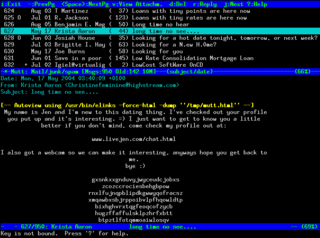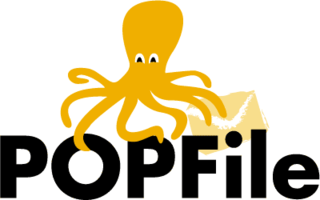This article has multiple issues. Please help improve it or discuss these issues on the talk page . (Learn how and when to remove these template messages)
(Learn how and when to remove this template message) Contents |
| Developer(s) | Mihai Bazon |
|---|---|
| Stable release | v0.4 / 25 March 2009 |
| Written in | Perl, JavaScript |
| Operating system | Cross-platform |
| Type | Webmail |
| License | GNU General Public License |
| Website | https://web.archive.org/web/20090315135539/http://www.xuheki.com// |
Xuheki is a web-based IMAP client written in Perl. It is completely build upon Ajax technology, i.e. there are no page reloads. Xuheki is released under the GNU General Public License. It uses persistent IMAP connections. The IMAP operations are not handled by the webserver itself, but by a Perl daemon which maintains connection to the IMAP server.

Perl is a family of two high-level, general-purpose, interpreted, dynamic programming languages, Perl 5 and Perl 6.
Ajax is a set of Web development techniques using many web technologies on the client side to create asynchronous Web applications. With Ajax, web applications can send and retrieve data from a server asynchronously without interfering with the display and behavior of the existing page. By decoupling the data interchange layer from the presentation layer, Ajax allows web pages, and by extension web applications, to change content dynamically without the need to reload the entire page. In practice, modern implementations commonly utilize JSON instead of XML due to the advantages of JSON being native to JavaScript.

The GNU General Public License is a widely used free software license, which guarantees end users the freedom to run, study, share and modify the software. The license was originally written by Richard Stallman of the Free Software Foundation (FSF) for the GNU Project, and grants the recipients of a computer program the rights of the Free Software Definition. The GPL is a copyleft license, which means that derivative work can only be distributed under the same license terms. This is in distinction to permissive free software licenses, of which the BSD licenses and the MIT License are widely used examples. GPL was the first copyleft license for general use.
Currently it supports only the Apache webserver and the installation script is written for Debian/Ubuntu based systems. It might nevertheless be easy to install it on every Linux system.
The Apache HTTP Server, colloquially called Apache, is free and open-source cross-platform web server software, released under the terms of Apache License 2.0. Apache is developed and maintained by an open community of developers under the auspices of the Apache Software Foundation.

Debian is a Unix-like operating system consisting entirely of free software. Ian Murdock started the Debian Project on August 16, 1993. Debian 0.01 was released on September 15, 1993, and the first stable version, 1.1, was released on June 17, 1996. The Debian stable branch is the most popular edition for personal computers and network servers, and is used as the basis for many other distributions.







